News + Media
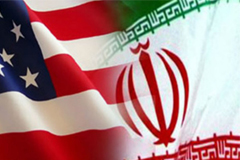 |
News@E40April 16, 2009Roadmap and rationale for U.S.-Iran relationsA months-long study of U.S.-Iran relations concludes that a new diplomatic approach by the United States to transform the relationship with Iran could produce a breakthrough that will boost security and prosperity for the entire region. The 50-page document by John Tirman, executive director and principal research scientist of the MIT Center for International Studies provides a roadmap and a rationale for the new approach. "Small gestures and better language are an improvement over the disastrous Bush policies," Tirman says, "but small steps are not enough. We need bold diplomacy for a breakthrough, and we can do so confidently because U.S. security is not at risk." The study was supported by the New Ideas Fund. Full text | News Release |
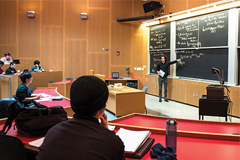 |
News@E40April 15, 2009Summer courses on innovation, biosecurityThe Center's Security Studies Program is offering two courses during the 2009 summer session for professional studies. From Technology to Innovation: Putting Ideas to Work, offered July 13-16, explores innovations in both public and private organizations in an effort to identify best practices. Combating Bioterrorism/Pandemics: Implementing Policies for Biosecurity, offered July 27-29, looks at the challenges public health, law enforcement, and national security agencies face in ensuring biosecurity. |
 |
News ReleaseApril 15, 2009CIS scholar provides roadmap and rationale for US-Iran relationsA months-long study of US-Iran relations concludes that a new diplomatic approach by the United States to transform the relationship with Iran could produce a breakthrough that will boost security and prosperity for the entire region. The 50-page document by John Tirman of the MIT Center for International Studies provides a roadmap and a rationale for the new approach. |
 |
News@E40April 10, 2009CIS awards 18 summer study grantsThe Center is pleased to announce the recipients of its summer study grants. The grants are being awarded to eighteen doctoral students in international affairs at MIT. Each will receive up to $4,500 for summer studies, which may be used for fieldwork, archival research, or home-based research and write-up. Criteria for the awards include the importance of the research question, the quality of the research proposal, and strong letters of support. |
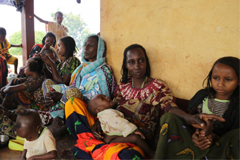 |
News@E40April 8, 2009PHRJ summer internship grantsThe Center's Program on Human Rights and Justice is now inviting applications for its 2009 summer internship program. Six internship positions are available for MIT students pursuing international work experience in human rights, the environment, and environmental justice. The awards are available to current undergraduate and graduate students who will be full-time students in 2009-10. Internships are available for a maximum of $4,000, of which $1,000 will be paid upon completion of an internship report and oral presentation in the fall. The internship grant may be used for travel, living stipend and related expenses. The deadline for applications is May 11, 2009. |
 |
News@E40March 31, 2009McKibben on the environmentScience has given us, in the last 18 months, a real bottom line for the planet: a CO2 concentration above which, as NASA's Jim Hansen has put it, we can't maintain the "planet similar to that on which civilization developed and to which life is adapted." Bill McKibben, a scholar in residence at Middlebury College, an American environmentalist and prolific writer on related topics, will be calling on MIT students to join a global movement to share that alarming scientific truth to as many folks as possible. The CIS Starr Forum, entitled "The Most Important Number in the World," will be on Monday, April 13, at 4:30 PM, in the Wong Auditorium. |
 |
News@E40March 17, 2009CIS co-sponsors Gaza symposiumThe second annual Gaza symposium, this year jointly organized by MIT and Harvard, will host a series of panels on the role of U.S. and international actors, as well as human rights and international humanitarian law in the wake of recent events in Gaza. Bringing together experts in the fields of human rights, history, political science, U.S. foreign policy and law, the two-day symposium will include a range of views from U.S., Israeli, Palestinian and UN/NGO perspectives. The public event will be held at MIT on Monday, March 30, and at Harvard University on Tuesday, March 31. For more details, visit the MIT-Harvard Gaza symposium event page. Video Now Available» |
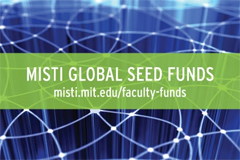 |
News@E40February 25, 2009MISTI awards Global Seed FundsMISTI's new Global Seed Funds Program selected 27 of 104 proposals for grant money to jump-start international projects. The winning entries represent 26 MIT departments, involve 42 countries, and include projects ranging from the study of stem cell-based engineered tissues to the regional, economic, and environmental implications of dual ethanol technologies in Brazil. The selected teams, which are faculty-led but rely on student participation, will use the awarded $457,400 to cover international travel, as well as meeting and workshop costs. MISTI will provide cultural preparation for participating students before their departure. "By enabling MIT students to participate in faculty-led international projects, we hope to increase opportunities for hands-on, global learning and connection to innovation around the world," said Richard Samuels, director of the Center for International Studies. Read More» |
 |
News@E40February 24, 2009On the calendarCitizenship Politics in Post-Soviet Russia: Between Identity and Real-Politika, Oxana Shevel, on March 10; The Search for Limits: American Foreign Policy in an Age of Austerity, David Hendrickson, on March 11; Techno-Blinders: How the Cult of Technology is Endangering U.S. National Security, Elizabeth Stanley, on March 18; and Human Rights and GIS Mapping Technologies, Lars Bromley, on March 18. |
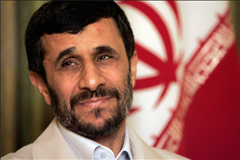 |
News@E40February 24, 2009Bustani Seminar on AhmadinejadOn Tuesday, March 3, Ali Banuazizi, psychology research professor and political science professor at Boston College, will assess Mahmoud Ahmadinejad's domestic and foreign policies over the past four years, with special emphasis on the populist style of his leadership, his messianic worldviews, his failing economic policies, and his re-election prospects in the upcoming June presidential elections. He will also talk about the current efforts, both in Iran and in the U.S., to promote a US-Iran rapprochement. The talk is part of the Emile Bustani Middle East Seminar. |
